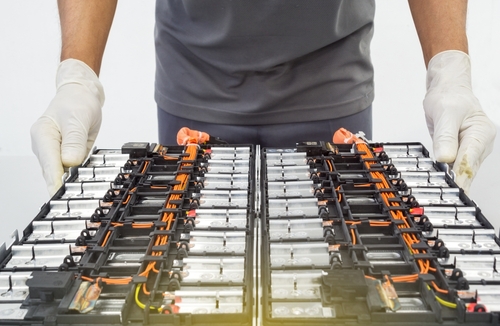How to Extend the Cycle Life of an Industrial Battery
April 14, 2024 2:44 pm Leave your thoughtsIndustrial batteries are crucial components in various industries, providing power for operations such as material handling, transportation, and backup power systems. Extending the cycle life of industrial batteries is essential for maximizing their efficiency, reducing operational costs, and ensuring continuous productivity. By implementing proper maintenance practices and following manufacturer guidelines, industrial battery users can prolong the lifespan of their batteries and optimize performance. In this blog, we will discuss how to extend the cycle life of an industrial battery, focusing on key strategies and best practices.
Proper Charging and Discharging Practices
One of the most critical factors in extending the cycle life of an industrial battery is utilizing proper charging and discharging practices. Overcharging or undercharging a battery can cause irreversible damage to the cells, reducing their capacity and longevity. To maintain optimal battery health, it is essential to follow the manufacturer’s guidelines for charging rates, voltages, and charging durations.
Avoiding deep discharges and ensuring regular recharging sessions can also help prolong the cycle life of industrial batteries. Deep discharges, where a battery is drained below a certain voltage threshold, can stress the cells and lead to premature capacity loss over time. By keeping the battery charged at regular intervals and avoiding frequent deep discharges, users can maintain the battery’s performance and extend its cycle life.
Implement Proper Maintenance Procedures
Regular maintenance is key to extending the cycle life of an industrial battery. Periodic inspections, cleaning, and testing can help identify issues early on and prevent potential failures. Industrial batteries should be inspected for signs of corrosion, leaks, or damage to the terminals, cables, or casing. Cleaning the battery terminals and connectors with a suitable solution and ensuring proper ventilation around the battery can prevent corrosion and improve conductivity.
Additionally, conducting regular capacity tests and monitoring the battery’s performance can provide valuable insights into its health and efficiency. If any abnormalities or inconsistencies are detected during testing, users should address them promptly to prevent further degradation of the battery. By implementing proper maintenance procedures and following a regular maintenance schedule, industrial battery users can extend the cycle life of their batteries and ensure reliable power supply.
Temperature Control and Environmental Conditions
Environmental factors, such as temperature and humidity levels, can significantly impact the performance and longevity of industrial batteries. Extreme temperatures, either too hot or too cold, can accelerate battery degradation and reduce its cycle life. To optimize battery performance and lifespan, users should store and operate industrial batteries within the recommended temperature range specified by the manufacturer.
Proper ventilation and airflow around the battery can also help dissipate heat and prevent overheating, which can damage the cells and reduce their capacity. Maintaining stable environmental conditions, such as temperature and humidity levels, can ensure the optimal performance and longevity of industrial batteries. By controlling temperature and environmental factors, users can extend the cycle life of their industrial batteries and maximize their operational efficiency.
Optimize Charging Infrastructure and Equipment
Investing in the right charging infrastructure and equipment can play a significant role in extending the cycle life of industrial batteries. Using high-quality chargers that are compatible with the battery type and specifications can help maintain proper charging rates and prevent overcharging. Smart chargers with built-in monitoring and diagnostic features can provide real-time data on the battery’s status and performance, allowing users to optimize charging processes and ensure efficient power delivery.
Additionally, implementing preventive maintenance practices for chargers and related equipment can help prevent malfunctions and ensure consistent performance. Regularly inspecting and testing chargers, cables, and connectors, and replacing faulty components promptly can prevent damage to the battery during the charging process. By optimizing the charging infrastructure and equipment, industrial battery users can enhance battery longevity and reliability, ultimately reducing operational costs and downtime.
Training and Education for Battery Users
Proper training and education for employees who handle industrial batteries are essential for ensuring the longevity and efficiency of the batteries. Providing training on safe handling practices, proper charging and discharging techniques, and preventive maintenance procedures can empower operators to maximize battery performance and lifespan. By educating users on the importance of battery care and maintenance, businesses can prevent common mistakes and errors that can lead to premature battery failure.
Regular training sessions and refresher courses on battery handling and maintenance can reinforce good practices and ensure compliance with safety guidelines. Encouraging open communication and feedback from battery users can also help identify potential issues or concerns early on and address them proactively. By prioritizing training and education for battery users, businesses can extend the cycle life of industrial batteries, minimize downtime, and optimize operational efficiency.
Summary
Extending the cycle life of an industrial battery requires a proactive approach, encompassing proper charging and discharging practices, regular maintenance, environmental control, optimized equipment, and user training. By following manufacturer guidelines, implementing preventive maintenance procedures, controlling environmental factors, investing in high-quality equipment, and promoting user education, industrial battery users can maximize the efficiency and longevity of their batteries. By prioritizing battery care and maintenance, businesses can reduce operational costs, improve productivity, and ensure reliable power supply for their operations.
Need Industrial Battery Supply in Jefferson, WI?
Remis Power Systems Inc has been a family-owned and operated business since 1980. We have become an industry-leading supplier of industrial batteries and chargers. We proudly maintain an impressive inventory of new and certified reconditioned Deka products for all your industrial battery needs. When you do business with, Remis Power Systems, you will find honest and experienced professionals who see things your way! We recognized each one of you had different needs and will work with you to customize our services to your needs. Whether you are in the market for a new or used battery, service program or unplanned service breakdown, we will be there to find the right solution for YOU! Contact us today!
Categorised in: Batteries, Industrial Batteries
This post was written by admin

